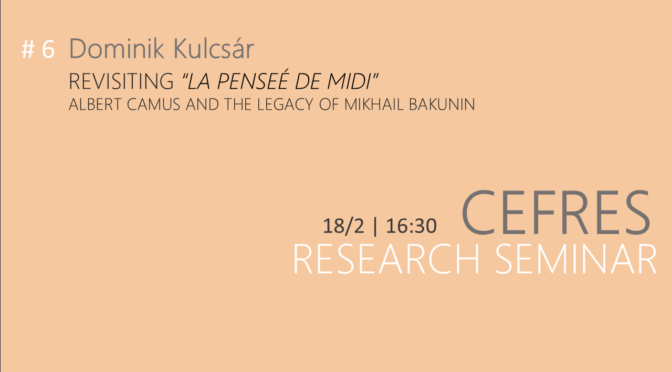Návrat k “La pensée de midi” – Albert Camus a odkaz Michaila Bakunina
Šestý zasedání Semináře CEFRESu
Mezioborový seminář si klade za cíl otevírat diskusi o vědeckých metodách, přístupech a konceptech. Účastníkům umožňuje vzájemně porovnávat své vědecké přístupy a seznamovat se s aktuálními tématy výzkumu napříč obory humanitních věd.
Místo konání: knihovna CEFRESu a online (odkaz k přípojení a text ke čtení, prosím, požadujte na adrese cefres@cefres.cz)
Datum: úterý, 18. února 2025, 16:30
Jazyk: angličtina
Seminář povede:
Dominik Kulcsár (CEFRES / Filozofický ústav Slovenskej akadémie vied)
Diskutující: Dan SWAIN (Filosofický ústav Akademie věd České republiky)
Abstrakt
Koncept transgrese je nezbytným pro zpochybnění či reformu státu quo. Ve chvíli, kdy stávající normy zastarají a stanou se kontraproduktivními, například když začnou podkopávat duševní blahobyt komunity nebo posilovat systémové nerovnosti, je naší morální povinností je zpochybňovat. Tyto normy je poté nutné reformovat nebo zcela odstranit. V samém jádru transgrese leží koncept revolty. Ta však v dnešní společnosti často slouží jako oblíbený prostředek k dosažení individuálních zájmů, mnohdy na úkor komunity. Pokud je revolta poháněna například představou svobody jakožto individuální sféry autonomie nepřístupné jakékoliv vnější interferenci, mohou být její dopady přímo devastující. Během nedávné pandemie covidu-19 jsme byli svědky vzpour ve jménu svobody proti opatřením v oblasti veřejného zdraví. Ve své dizertaci konfrontuji toto mylné pojetí svobody rekonstruováním konceptů revolt v textech ruského anarchisty Michaila Bakunina a francouzského existenciálního spisovatele Alberta Camuse. Jelikož oba myslitelé provázali pojem revolty s pojmem svobody, snažím se v jejich dílech nalézt myšlenky, které by mohly být kriticky převedeny do uceleného chápání racionální revolty. Konkrétně se zajímám o to, jak efektivně dokáže revoltující jedinec zpochybnit existující normy a instituce a usilovat o jejich proměnu či úplné zrušení (pokud je to potřeba) konstruktivním způsobem, tedy takovým, který zlepšuje současné podmínky, místo aby je pouze bez náhrady zničil. Dizertace staví na již existujícím, často však přehlíženém, vztahu mezi Bakuninem a Camusem. Konkrétně v roce 1952, jako odpověď francouzskému anarchistovi Gastonu Levalovi, Camus napsal: „Bakunin je živý ve mně, stejně jako v naší době.” Ačkoliv tato věta odkazuje především na sdílený kritický postoj vůči autoritářskému státnímu socialismu, zjistil jsem, že Bakuninův a Camusův pohled na vzpouru se koncepčně hluboce doplňují. Cílem prezentace je nejprve představit má dosavadní zjištění a následně vyhodnotit, nakolik je Camus svému anarchistickému předchůdci zavázán.
Kompletní program semináře pro 2024-2025 naleznete zde.

